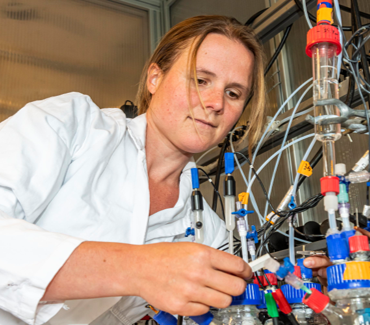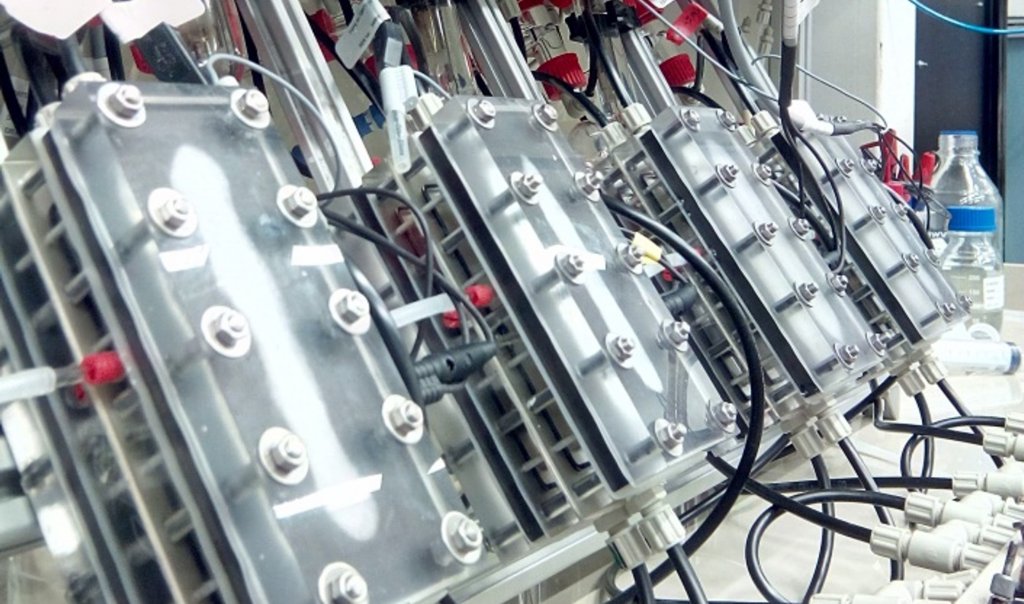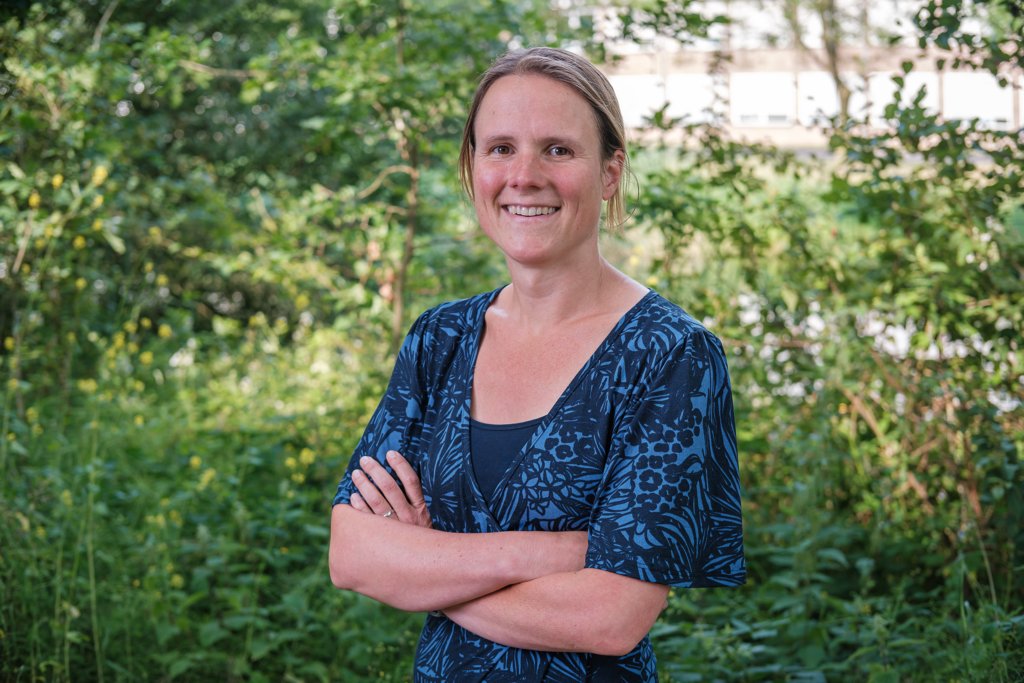Meet our Energizer! Annemiek ter Heijne
Annemiek ter Heijne is full professor and chairholder of the Environmental Technology group at Wageningen University & Research (WUR). Recently, she held her inaugural lecture at WUR. Annemiek is a founding member of the Wageningen Energy Alliance (WEA) and member of the 4TU.Energy Advisory Board.
Annemiek’s work focuses on resource recovery technologies, which generally uses waste streams to extract valuable resources. This can be done in all sorts of ways and often involves a combination of biological, chemical, and physical processes to recover valuable nutrients, metals and energy, carbon (in the right form), from waste streams.
Integrating energy solutions in circular chemical processes
Resource recovery technologies are developed to find sustainable ways to use the earth’s materials and therefore have a clear link to 4TU.Energy’s mission. In finding sustainable ways to reuse materials, circularity plays an important role: the way in which we can recover used materials and return them to the economic cycle. One example is breaking down plastics to make new plastics. Another example is nutrients in agriculture, which is closely linked to the energy transition.
The different steps in the process of breaking down nutrients or plastics and building them up for new applications require energy. In some cases, wastewater and waste streams themselves contain these energy sources, and the process can be self-sufficient in the energy it needs. Annemiek says “There are opportunities to do something with the energy in wastewater and waste streams, even if we can't find another use for it. For example, we use anaerobic digestion in wastewater to convert organic compounds such as sugars and carbohydrates into methane gas.”
Even more closely related to energy conversion are electrochemical systems, where researchers use electrodes to exchange electrical energy with chemical energy. The conversion of water and oxygen is fairly well known and is being explored by other research groups. Annemiek adds: “The central question in our research group is: How can we use these systems for resource recovery and for new biological conversions, e.g. generation of methane from CO2 and electricity?”
Fostering collaborative work for the benefit of the environment
“The environment is at the heart of my work.” says Annemiek. “It is about preserving the earth for future generations. One example of this is paying attention to climate change. We need to build a society with sustainable energy.”
In Annemieks vision and work, connection is a very important keyword: “I see this not only for 4TU, but also between technology and other fields, in society and politics. The way I see it, the problems we face as a society are very complex. I can't save the world on my own, so I'm looking for connections.”
The environmental passion of Annemiek resonates strongly with the foundation of education at WUR. She adds: “At Wageningen University & Research, the educational courses fall within the field of environmental technology and science. We train students to have a broad view of the environment, with a specialisation in technology. This broad scope in the study program is what excites me!”
Prioritizing well-being: cultivating balance in a busy academic career
For Annemiek, the most challenging part of her job is the way in which academia works. There is a lot of pressure to perform. When Annemiek reflects on the working culture, she says: “We all do our best and are proud of our hard work. But I personally notice that there is little room for inspiration and creativity. Could it be that we take too much pride in hard work as a virtue, and would it be possible to take just as much pride in finding a good work-life balance?”
Annemiek says: “I have always worked four days, even as a full professor I still work four days. This is a personal choice, for me the balance between work and private life is very important and I can imagine that others need it just as much as I do. That’s why I applied for the position of full professor and chair, I want to take away the example that 60 hours a week is cool and necessary to build a career in academia.”
Overcoming the major hurdles in scaling scientific breakthroughs
There are, of course, also challenges in the scientific work that Annemiek conducts with her group. Annemiek: “In our lab, we typically conduct experiments involving small volumes in our reactor, up to a few hundred millimetres of chemicals. The big challenge is to make the small-scale processes we find in the lab interesting for companies to scale up. We can prove and study certain chemical processes in the lab, but will it be taken up and scaled up by companies? Unfortunately, it often gets stuck at the lab scale. And it is only when companies see the potential the technology moves forward. Getting our work into practice is our job as technologists. Often this does not happen, but it does happen for a small proportion of discoveries. Essentially, the challenge is getting companies interested and scaling up.”
The key to generating interest with companies often involves networking, visiting companies and meeting representatives. As a technologist, you learn where the challenges lie for these companies. Again, ‘connection’ is at the heart of tackling this challenge.
Annemiek has experienced how young researchers and budding scientists can be put in touch with companies through her time as a PhD candidate at Wetsus, the European centre of excellence for sustainable water technology. This centre brings together different universities and companies. On a regular basis, the progress of research projects is presented to the companies in this network. Annemiek: “As a young researcher I was forced to explain my project in a way that was understandable and I found that a valuable lesson. My experience with Wetsus proved to be a solid basis for acquiring networking skills too. I would like to see more initiatives to initiate exchanges between academia and industry.”
Navigating fragmentation to drive the energy transition
When asked for her personal opinion regarding the energy transition, Annemiek says: “I am reluctant when it comes to opinions. I don't find opinions that interesting. It is very obvious to me that we need an energy transition.
In the educational courses I am involved in, I give lectures on renewable energy. I ask my students: What is the share of renewables in our current energy mix? It is very little! More than three quarters of the mix consist of fossil fuels. So, I have significant concerns regarding the energy transition, particularly regarding how it can unfold given the low percentage of renewable energy sources.
I'm exploring alternative approaches to addressing these issues. The challenges we face are so complex and interconnected with broader societal issues, making it challenging to allocate resources effectively. We don’t want conflict and famine, but we have to recognize the inherent interdependence between broader challenges in society. What concerns me most is the fragmentation that I have observed in The Netherlands, whether it's at a political level or within academia. This compartmentalisation makes it difficult to find each other and connect.”
Connecting through education at 4TU.Energy
Considering these challenges in navigating fragmentation, what Annemiek looks forward to is the 4TU.Energy Community Day 2024. Annemiek: “I really enjoy getting together with colleagues from four universities on this day. In addition, I look forward to stepping into my role as member of the advisory board. It is very important to put education on the agenda of 4TU.Energy. I ask myself what the profiles of the individual universities of technology are and how we could put these profiles into good use, finding more connections for research and education and further improving links with industry.






